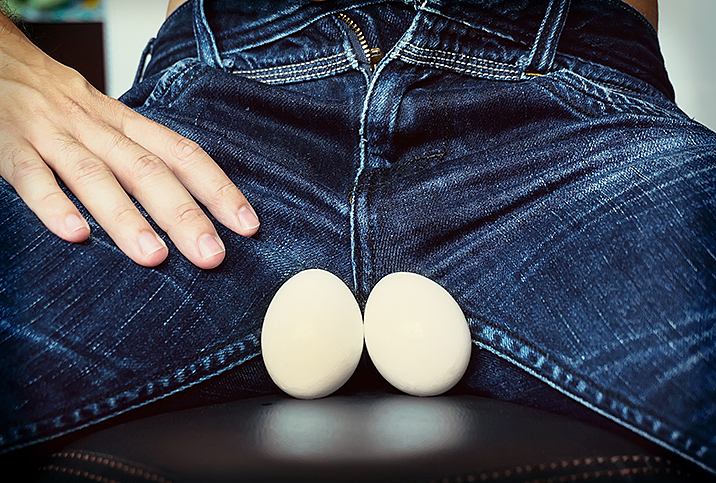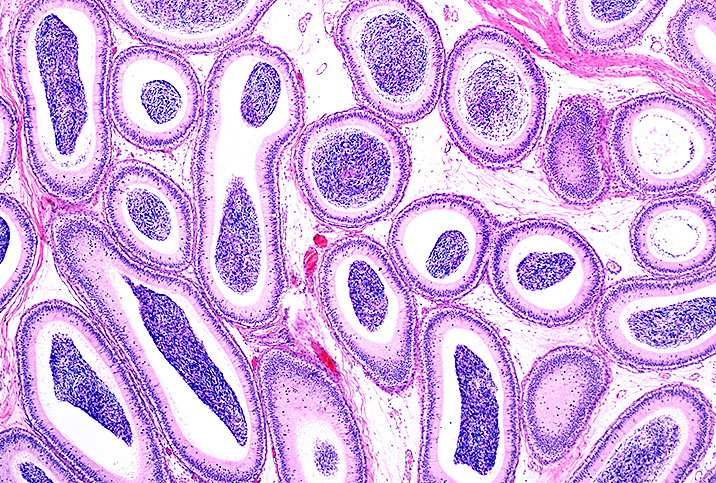Epididymitis and Orchitis Share Painful Symptoms

Care of the testicles can be a complicated business. As anyone who owns a pair knows, testicles are finicky fellows. They're prone to lash out at their owner with nauseating pain at the slightest offense, get pinched and twisted in tight clothing and develop embarrassing itches and rashes with little provocation. And any testicle owner will likely cringe and involuntarily close his legs at the mention of (thankfully rare) problems such as testicular torsion.
Much more common, though, is a pair of testicular issues less serious but irritating: epididymitis and orchitis. Here, we'll look at the similarities and differences between the two.
Epididymitis
Epididymitis and orchitis are often lumped together under the term epididymo-orchitis, or sometimes orchi-epididymitis.
But one major difference is that epididymitis affects one particular part of the testicle, the epididymis, while orchitis affects the entire testicle.
The epididymis is a long, tightly coiled tube that sits at the back of each testicle, where sperm is stored as it matures before being transferred to the vas deferens. From there, it's mixed with seminal fluid and ejected when a man ejaculates.
Epididymitis is the inflammation of this tube, most often as the result of a bacterial infection. Epididymitis affects about 600,000 U.S. men per year, according to a 2002 survey by the Centers for Disease Control and Prevention (CDC). Guys between the ages of 18 and 35 are affected most often by the condition, and the underlying cause is usually a bacterial infection.
For sexually active men, epididymitis is frequently triggered by a chlamydia or gonorrhea infection that has passed through the urethra and spread back into the body and infected the epididymis. Boys and older men who aren't sexually active who present with epididymitis usually have an E. coli infection or other bacterial infection to blame.
Orchitis
The term orchitis comes from the Greek root word for testicle, also the root word for orchid. As indicated by the name, orchitis is a direct infection of one or both testicles, causing swelling and inflammation in the affected testicle.
Orchitis is frequently seen in boys and men who contract mumps—14 to 35 percent of them, according to the Principles and Practice of Pediatric Infectious Disease.
But the condition can be caused by many different viruses and bacteria. Orchitis can be triggered by a sexually transmitted infection (STI) or disease (STD) such as chlamydia or gonorrhea, and it can occur concurrently with infections of the prostate or epididymis.
Similarities
Some of the symptoms of both epididymitis and orchitis include:
- Fever
- Swelling and pain in the affected testicle
- Redness in the scrotum in the affected area
- Burning when urinating
- Painful ejaculation
- Yellow or white discharge from the penis
- Heaviness in the scrotum
- Discomfort or swelling of the prostate
Differences
While you'll notice a lot of similarities between the two conditions, keep in mind these key differences:
- Epididymitis usually presents with a gradual onset of pain and discomfort at the back of the testicle, while orchitis pain most often develops more quickly and is focused on the entire testicle.
- Orchitis often comes hand-in-hand with lymph node swelling.
- Though less common, men with epididymitis have reported that their testicle pain worsens during bowel movements.
Conclusions
Epididymitis is much more common than orchitis. By now, it should be apparent that they're closely related and even intertwined. Luckily, both conditions are treated easily with antibiotics, anti-inflammatory drugs, ice packs and elevation.
However, it's important for men and boys who experience testicle pain and swelling to understand that these symptoms can indicate a more serious condition that requires immediate medical intervention. For instance, testicular torsion is a twisting of one or more blood vessels that cuts off the blood supply to a testicle.
If you have testicular pain that's more than a passing thing, it's wise to see a doctor no matter what. Plus, the antibiotics needed to clear an infection at the root of epididymitis or orchitis are available only via prescription.
Taking care of your testicles isn't all that difficult as long as you listen to what they're trying to tell you.

















